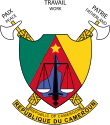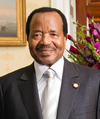Portal:Cameroon
The Cameroon Portal
Cameroon, officially the Republic of Cameroon, is a country in Central Africa. It shares boundaries with Nigeria to the west and north, Chad to the northeast, the Central African Republic to the east, and Equatorial Guinea, Gabon, and the Republic of the Congo to the south. Its coastline lies on the Bight of Biafra, part of the Gulf of Guinea, and the Atlantic Ocean. Due to its strategic position at the crossroads between West Africa and Central Africa, it has been categorized as being in both camps. Cameroon's population of nearly 31 million people speak 250 native languages, in addition to the national tongues of English and French, or both. Early inhabitants of the territory included the Sao civilisation around Lake Chad and the Baka hunter-gatherers in the southeastern rainforest. Portuguese explorers reached the coast in the 15th century and named the area Rio dos Camarões (Shrimp River), which became Cameroon in English. Fulani soldiers founded the Adamawa Emirate in the north in the 19th century, and various ethnic groups of the west and northwest established powerful chiefdoms and fondoms. The official languages of Cameroon are French and English, the official languages of former French Cameroons and British Cameroons. Christianity is the majority religion in Cameroon, with significant minorities practising Islam and traditional faiths. It has experienced tensions from the English-speaking territories, where politicians have advocated for greater decentralisation and even complete separation or independence (as in the Southern Cameroons National Council). In 2017, tensions over the creation of an Ambazonian state in the English-speaking territories escalated into open warfare. Large numbers of Cameroonians live as subsistence farmers. The country is often referred to as "Africa in miniature" for its geological, linguistic, and cultural diversity. Its natural features include beaches, deserts, mountains, rainforests, and savannas. Cameroon's highest point, at almost 4,100 metres (13,500 ft), is Mount Cameroon in the Southwest Region. Cameroon's most populous cities are Douala on the Wouri River, its economic capital and main seaport; Yaoundé, its political capital; and Garoua. Limbé in the southwest has a natural seaport. Cameroon is well known for its native music styles, particularly Makossa, Njang, and Bikutsi, and its successful national football team. It is a member state of the African Union, the United Nations, the Organisation Internationale de la Francophonie (OIF), the Commonwealth of Nations, the Non-Aligned Movement, and the Organisation of Islamic Cooperation. (Full article...) Selected article -Nki National Park (Parc national de Nki, also Réserve de Nki) is a national park in southeastern Cameroon, located in its East Province. The closest towns to Nki are Yokadouma, Moloundou and Lomie, beyond which are rural lands. Due to its remoteness, Nki has been described as "the last true wilderness." It has a large and varied ecosystem, and it is home to over 265 species of birds, and the forests of Cameroon contain some of the highest population density of forest elephants of any nation with an elephant density of roughly 2.5 per square kilometer for Nki and neighboring Boumba Bek National Park combined. These animals are victims of poaching, which has been a major problem since an economic depression in the 1980s. The indigenous people follow in the footsteps of the poachers, attracted by the financial opportunities. The removal of logging industries from the park, on the other hand, has been a success; it is no longer considered a major threat to Nki's wilderness. (Full article...) Did you know (auto-generated)
More did you know -General images -The following are images from various Cameroon-related articles on Wikipedia.
WikiProjectsTopicsCategoriesRelated portalsAssociated WikimediaThe following Wikimedia Foundation sister projects provide more on this subject:
Discover Wikipedia using portals | ||||































































